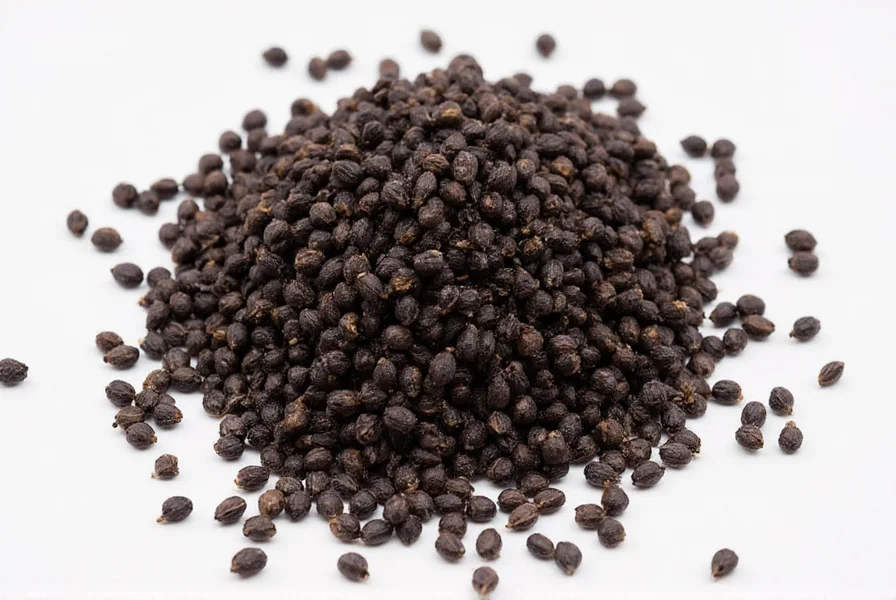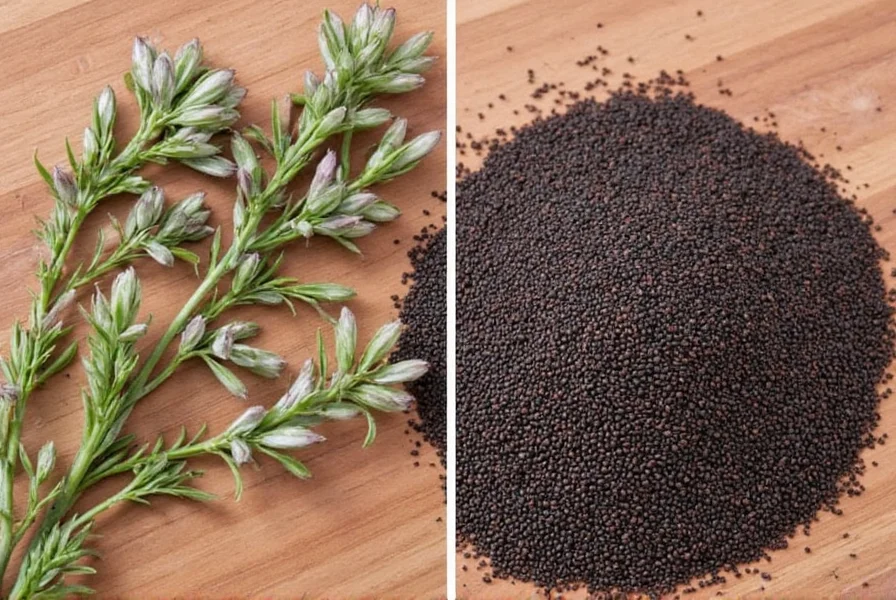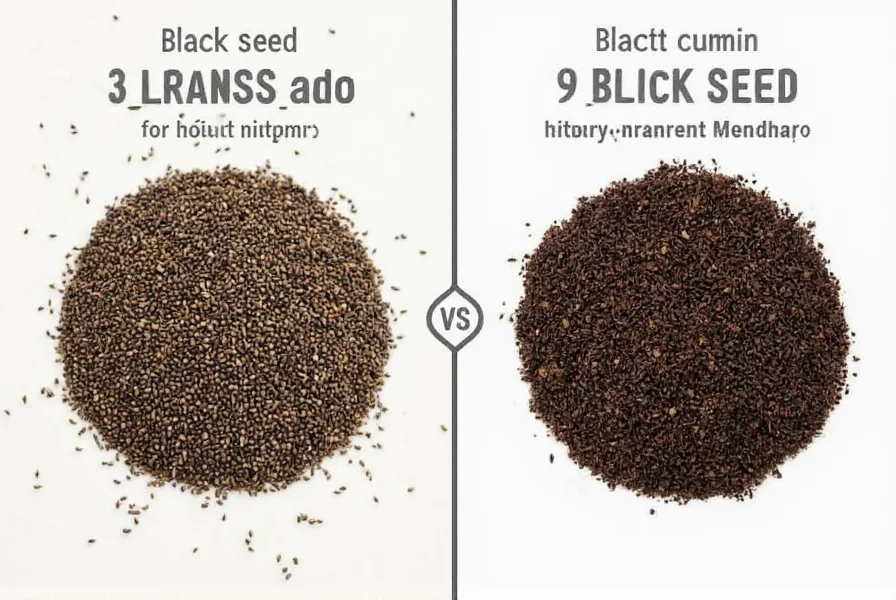Understanding the distinction between black seed and black cumin is essential for anyone exploring natural remedies or traditional cooking ingredients. Many consumers wonder whether black seed vs black cumin difference exists, often encountering conflicting information online. The scientific consensus confirms they represent the same plant species, Nigella sativa, belonging to the Ranunculaceae family. This small, black, teardrop-shaped seed has been referenced in historical texts including ancient Egyptian records and Islamic traditions as a versatile therapeutic agent.
Botanical Identification and Terminology Clarification
The confusion surrounding black seed or black cumin terminology stems from regional naming variations. In Arabic-speaking regions, it's commonly called "habbat al-barakah" (blessed seed), while in Indian subcontinent, it's known as "kalonji." The term "black cumin" creates particular confusion because it's also used for Bunium bulbocastanum (black caraway), a completely different plant. True black cumin (Nigella sativa) should not be confused with regular cumin (Cuminum cyminum) or black caraway.
| Common Name | Scientific Name | Distinctive Characteristics |
|---|---|---|
| Black Seed / Black Cumin | Nigella sativa | Small, matte black, teardrop-shaped seeds with a pungent, slightly bitter flavor |
| Regular Cumin | Cuminum cyminum | Lighter brown, elongated seeds with warm, earthy flavor |
| Black Caraway | Bunium bulbocastanum | Dark brown to black, oval seeds with stronger flavor than regular cumin |
Nutritional Composition and Active Compounds
Nigella sativa seeds contain over 100 bioactive compounds, with thymoquinone representing the most extensively studied component. This potent antioxidant constitutes 30-48% of the seed's essential oil. Other significant compounds include:
- Nigellone (a volatile oil with bronchodilatory effects)
- Thymohydroquinone (a powerful antioxidant)
- Fatty acids (primarily linoleic and oleic acids)
- Proteins and amino acids
- Dietary fiber
- Calcium, iron, and potassium
Research published in the Journal of Ethnopharmacology confirms that scientific studies on black seed demonstrate significant antioxidant capacity, with ORAC (Oxygen Radical Absorbance Capacity) values substantially higher than many common spices.

Evidence-Based Health Benefits
Modern research has validated many traditional uses of black cumin. A comprehensive 2022 meta-analysis in Phytotherapy Research examined 147 clinical trials involving Nigella sativa, revealing several evidence-supported applications:
Immune System Support
Multiple studies document black seed's immunomodulatory effects. Research in the American Journal of Immunology demonstrated that thymoquinone enhances natural killer cell activity while regulating inflammatory responses. This dual action makes black seed for immune support particularly valuable during seasonal health challenges.
Cardiovascular Health
A 2023 systematic review in Nutrition Reviews concluded that Nigella sativa supplementation significantly reduces LDL cholesterol and systolic blood pressure. The analysis of 28 randomized controlled trials showed average reductions of 18.9 mg/dL in LDL and 5.4 mmHg in systolic pressure among participants consuming black seed oil.
Respiratory Wellness
Historically used for respiratory conditions, modern research supports black cumin seed oil uses for respiratory health. A double-blind trial with 80 participants published in Lung India found that black seed oil supplementation improved peak expiratory flow rates by 21.3% in individuals with occasional breathing discomfort.
Practical Applications and Usage Guidelines
Understanding how to properly incorporate Nigella sativa into daily routines maximizes its potential benefits:
Culinary Uses
Black seeds add distinctive flavor to breads, cheeses, and vegetable dishes. In Indian cuisine, kalonji features prominently in naan bread and pickles. The seeds develop richer flavor when dry-roasted before use. Unlike regular cumin, black cumin seeds maintain their potency when cooked, making them versatile for both raw and cooked applications.
Supplement Forms and Dosage
For therapeutic purposes, standardized extracts provide consistent thymoquinone content. Research indicates effective daily doses of:
- Whole seeds: 1-3 grams
- Seed oil: 1-3 mL
- Standardized extract (containing 2.5-5% thymoquinone): 500-1000 mg
Consistency matters more than timing—taking black seed supplements with meals enhances absorption of its fat-soluble compounds.

Safety Considerations
Nigella sativa demonstrates excellent safety profile in standard culinary and supplemental doses. However, certain considerations apply:
- Pregnant women should avoid medicinal doses due to potential uterine stimulation
- May interact with blood pressure medications and diabetes treatments
- Topical application may cause skin sensitivity in some individuals
- Discontinue use at least two weeks before scheduled surgery
The European Medicines Agency classifies Nigella sativa as generally safe when used appropriately. As with any supplement, consulting a healthcare provider before starting regular use is recommended, particularly for individuals with pre-existing health conditions or those taking prescription medications.
Conclusion
The question of black seed or black cumin ultimately resolves to understanding they represent the same valuable botanical resource. Nigella sativa offers a remarkable combination of culinary versatility and scientifically supported health benefits. By recognizing its proper identification, understanding evidence-based applications, and using it appropriately, individuals can incorporate this ancient remedy into modern wellness practices with confidence. The growing body of research on nigella sativa health benefits continues to validate traditional knowledge while revealing new potential applications for this remarkable seed.
Frequently Asked Questions
Are black seed and black cumin the same thing?
Yes, black seed and black cumin refer to the same plant: Nigella sativa. The confusion arises because "black cumin" is sometimes incorrectly used for other seeds like Bunium bulbocastanum (black caraway). True black cumin is Nigella sativa, which has been used for centuries in traditional medicine systems across multiple cultures.
What's the most effective way to consume black cumin seeds for health benefits?
Research suggests that cold-pressed black seed oil provides the highest concentration of active compounds like thymoquinone. For maximum absorption, take 1 teaspoon of oil with food. Alternatively, you can grind whole seeds just before use to preserve potency, as pre-ground seeds lose volatile compounds quickly. Standardized extracts offering 2.5-5% thymoquinone provide consistent dosing for therapeutic applications.
How long does it take to experience benefits from black seed supplementation?
Most clinical studies show measurable effects within 4-8 weeks of consistent daily use. Immune support benefits may be noticeable within 2-3 weeks, while cardiovascular improvements typically require 6-12 weeks. The timeframe varies based on individual factors including baseline health status, dosage, and the specific health concern being addressed. Consistency in usage is more important than timing of consumption.
Can I use black cumin seeds if I'm taking blood pressure medication?
Black cumin seeds may enhance the effects of blood pressure medications due to their natural hypotensive properties. If you're taking antihypertensive medications, consult your healthcare provider before using black seed supplements. They may need to monitor your blood pressure more closely and potentially adjust your medication dosage to prevent excessively low blood pressure.
What's the difference between black cumin and regular cumin?
Black cumin (Nigella sativa) and regular cumin (Cuminum cyminum) are completely different plants. Black cumin seeds are smaller, matte black, and have a more pungent, slightly bitter flavor with oregano-like notes. Regular cumin seeds are lighter brown, elongated, and have a warmer, earthier flavor. They belong to different plant families and contain distinct phytochemical profiles, with black cumin containing thymoquinone as its primary active compound.











 浙公网安备
33010002000092号
浙公网安备
33010002000092号 浙B2-20120091-4
浙B2-20120091-4